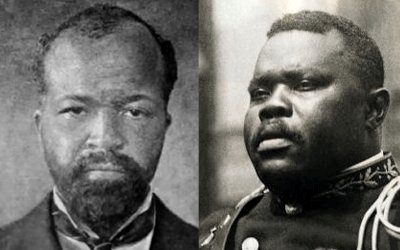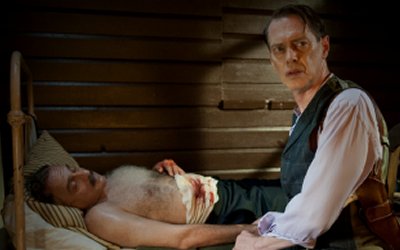Valentin Narcisse and Marcus Garvey

Ishmael Reed has a question about Boardwalk Empire on his Speakeasy blog, in the Wall Street Journal: he wants to know if the HBO show is trampling on the legacy of Marcus Garvey, also known as the “black Moses.” (Garvey’s middle name was actually Mosiah, by the way). Marcus Garvey was one of the early black leaders in the beginning of the 20th century, a Jamaican, who advanced the Pan-African movement into global proportions, among other achievements.
Boardwalk Empire introduced Dr. Valentin Narcisse (Jeffrey Wright) in Resignation (S4 E2), when he took advantage of a situation that involved a white couple engaging in their cuckold fetish with the at first willing participation of Chalky White’s (Michael Kenneth Williams) henchman, Dunn Purnsley (Erik LaRay Harvey), until Dunn finds out their true intent and kills the husband, a talent agent named Dickie Pastor (Jeremy Bobb). After escaping, Mrs. Pastor (Jo Armeniox) cries rape to Narcisse, who wangles a 10% interest in Chalky’s Onyx Club as reparation for Dickie’s murder. Then he has his henchmen murder Mrs. Pastor.
In the next episode, Acres of Diamonds, we see Narcisse exhorting the virtues of education and culture to a group of black men with a sign on the wall that says “Universal Negro Improvement Association,” an institution started by Marcus Garvey. He sends the men away when Arnold Rothstein and Owney Madden, two well-known gangsters, show up to discuss a huge heroin sale — to Narcisse.
Ishmael Reed says this “shocked even me.” Speakeasy sought answers from HBO as to why Boardwalk Empire writers associated a real-life black leader’s group with “murder, drugs and other kinds of wrongdoing.” HBO responded that Narcisse is a fictional character and they are not implying that Marcus Garvey was involved in any of the criminal enterprises that Narcisse is. (Duh!) HBO sent them a link to the interview where Jeffrey Wright named Casper Holstein as the very loose inspiration for his character. Ishmael Reed apparently takes issue with that association, as well, complaining that Holstein was never associated with heroin or the murder of a white woman and proceeds to elaborate on Holstein’s philanthropic endeavors.
Without going into the long history of people who engaged in criminal activities and shared some of the proceeds with the common folk to gain their affection (Al Capone did it, too, in real life), let’s just say it is not that far-fetched that there were people in the 1920s who subverted many philosophies for personal gain.
Latest Season 4 Spoilers for Boardwalk Empire
Jeffrey Wright says that unlike Casper Holstein, there is no benevolent side to Valentin Narcisse. He’s only been in two episodes and we didn’t see an ounce of benevolence. It’s clear that money and power are his real goals and committing a few crimes won’t stand in the way of those pursuits. Dr. Narcisse is also an elitist, who does not mean to educate and share any culture with the likes of Chalky White or Dunn Purnsley. People he considers beneath him are mere tools to such a one as Valentin Narcisse.
The important word to remember in any debate on the topic is “FICTIONAL.” Narcisse is not meant to be a historical recreation of Casper Holstein or anyone else’s life story. He is there to dump shit in Chalky White’s world and (hopefully) get to go to the Boardwalk Empire Fictional Bone Yard before the end of Season 4. We’re rooting for that – and kinda hoping Chalky’s bare hands are involved in the dispatch!
We may earn a small commission from qualifying purchases made from Amazon.com links at no cost to our visitors. Learn more: Affiliate Disclosure.









The fact that this is a fictional character becomes irrelevant when there is a connection to a real organization– there is a responsibility to be mindful of a person’s or organization’s actual legacy that accompanies that territory. A film loosely based on the life of Ronald Reagan that showed him dealing drugs and murdering people would be condemned– actually, it wouldn’t be because it would never get made, and that is part of the point. The legacies of some people are valued as sacrosanct, and the legacies of others are open season, and that determination is usually predictable based upon the historic structure of power in the U.S., whether you are talking about historically underrepresented groups like numerical minorities, or historically objectified groups like women or “natives.”
A second point is that the fact that there have always been two-faced social benefactors is irrelevant in this situation because what is issue is the nature of the criminality being portrayed. Running numbers, what Holstein did, is a far cry from dealing heroin– comparing the two is akin to lumping having a cold together with having terminal cancer– and the choice to deal with one vice versus the other is very much related to one’s political philosophy. “Policy” as a revenue source for philanthropy mirrors our current legalized state lotteries, which allegedly fund public school and roads, and is a far cry from turning a blind eye to the destructiveness of heroin in the very community you claim to serve. One is the way to make something semi-positive happen when their are limited options and a demand for opportunities to advance no matter how slim the odds, while the other is the height of hypocrisy, knowingly destroying while throwing on a public grin, e.g , BP changing its branding to all green & yellow to mask its environmental record. The point is that this fallacy leads to false comparisons like Holstein running numbers and supporting UNIA schools and community activities is the same as Capone bashing in people’s heads, running brothels, dealing drugs, and ordering dozens of hits while ha ding out thanksgiving turkeys. Not the same.
HBO should be ashamed & I expect a better analysis in the future from the brilliantly talented and highly community minded Mr. Wright.
I don’t know what you mean that I am trying to “piggyback” and I can assure you I have no “political purposes.” I’ve been following opinions of who Valentin Narcisse is based upon since his character was introduced on the show and if I want to talk about them, I will. Some people actually thought Narcisse was based on W.E.B. DuBois or Marcus Garvey, even after the actor came out and said it was Casper Holstein.
As for this “let’s just say it is not that far-fetched that there were people in the 1920s who subverted many philosophies for personal gain.” — sorry, I actually meant to change “in the 1920s” to “throughout the ages” — even the bible addresses that.
I wrote this before “All In” aired, and didn’t know the writers were going to actually have Narcisse using Marcus Garvey’s office. I would agree that this is going to give the impression that Narcisse personally knows Garvey, and that is going to offend some people. I’m not even going to delve into that. I mean, there’s no way to prove whether Marcus Garvey knew people who were one thing to his face and another in real life, but since he was a human being, he no doubt did.
Not truly understanding of what you mean here. I believe that Reed is simply stating that HBO should have made NO connection between this character and Marcus Garvey. They could have introduced him in any other context and it would have been more than acceptable. Chalky White is a semi-fictitious character among real life depictions of persons in American history, but with him there is no connection to a righteous black historical figure from the Atlantic city area. That can be seen as legitimate because it doesn’t discredit any organizations values such as Narcisse is doing. TO look past this and think its OK is wrong and should be addressed by any person regardless of color. Its a blasphemous attempt at trying to create a unacceptable version of history.
And to say, “let’s just say it is not that far-fetched that there were people in the 1920s who subverted many philosophies for personal gain.” is a similar attempt to steer history because the statement itself is fallacious in nature but designed to make the reader think acertain way without all of the facts. Reed’s article is much more valid than this and I think that the writer is just trying to piggyback and contradict his points for political purposes.